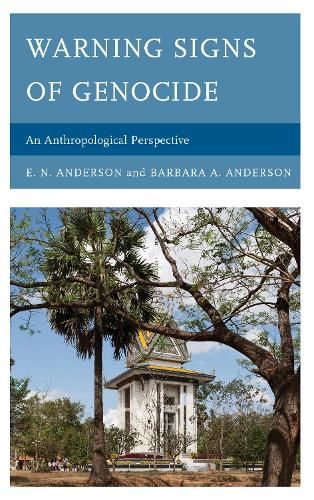
Warning Signs of Genocide: An Anthropological Perspective
(Paperback)
Publishing Details
Warning Signs of Genocide: An Anthropological Perspective
By (Author) E.N. Anderson
By (author) Barbara A. Anderson
Bloomsbury Publishing PLC
Lexington Books
10th October 2014
United States
Classifications
Tertiary Education
Non Fiction
Social and cultural anthropology
Anthropology
Social discrimination and social justice
364.151
Physical Properties
Paperback
230
Width 159mm, Height 235mm, Spine 23mm
490g
Description
Genocide occurs when a government attempts to exterminate systematically a large percentage of its own citizens or subjects, simply because they fall into a particular group defined by religion, ethnicity, political affiliation, or (rarely) other group identification ranging from occupation to gender status. Genocide has been a major cause of death worldwide over the last 100 years or more, and is far from being eliminated. Through examining available cases, Warning Signs of Genocide: An Anthropological Perspective shows that genocide becomes a live danger when group hatredsespecially religious, ethnic, and politicalare exploited by political regimes as major ways of seizing and maintaining power. Genocide is actually invoked, however, only when such regimes feel they are threatened, usually either because they are new and not consolidated in power or because they are challenged by local rebellions, civil war, or (less often) international war or major economic decline. Knowing these warning signs should make the international community take note that genocide is virtually certain to occur, and take action to stop it. This book joins others in noting that the international community has rarely intervened in time, and in the hope that these findings will encourage more prompt action.
Reviews
The book Warning Signs of Genocide: An Anthropological Perspective is a major contribution to addressing one of the crucial problems of humanity in our timeshow to prevent genocide. Based on years of traveling and close knowledge of persons whose lives have been altered forever by the horrors of genocide, they propose the warning signs that give humanityif it so willsthe possibility to know about genocide before it happens, and perhaps to prevent it. The authors use an original public health approach (what might be called epidemiology of genocide). They suggest a predictive model of genocide and offer strategies for prevention, that can help humanity eliminate the deadly seeds of genocide before the soil is poisoned. -- Yair Auron, PhD, The Open University of Israel
Anderson (emer., Univ. of California, Riverside) and Anderson (Frontier Nursing School) have produced a thought-provoking study of the causes of genocide, employing methodologies from anthropology and public health to make their case. The authors are clear that they have not penned a complete review of genocide studies, nor are they intending "to just speak to genocide scholars." Rather, they offer "a new explanation ... an epidemiology of genocide." Using both recent and historical examples, they explore indirect and direct causes of genocide, providing readers with a robust perspective on causative factors that give rise to instances of genocide. The Andersons also identify "good seeds," factors that might reduce the risk of future genocides: accountable governance is one such good seed they cite. The book, which includes useful appendixes and a comparison of past genocides, could have benefited from a more thorough explication of the methods they employed, but overall, this is a solid contribution that speaks to audiences beyond genocide scholars. Summing Up: Recommended. Upper-level undergraduates, graduate students, and professionals/practitioners. * CHOICE *
Author Bio
Barbara A. Anderson, DrPH, is Director of the Doctor of Nursing Practice (DNP) at Frontier Nursing University. Her doctoral and post-doctoral work was at Loma Linda University and Stony Brook University. She is a public health specialist and nurse-midwife with extensive teaching, service and consultation experience in Africa, South Asia, Southeast Asia, and Central and South America. She conducted doctoral work and has been a consultant with refugee health in the refugee camps along the Cambodian border, in Cambodia and for resettled refugees in the United States. She has numerous publications focusing on health issues among vulnerable populations. She co-authored both the 2nd and 3rd edition of Caring for the Vulnerable, Perspectives in Nursing Theory, Practice and Research, with Dr. Mary de Chesnay. The 3rd edition won an American Journal of Nursing award as best nursing book of the year in 2012. E. N. Anderson is Professor of Anthropology, Emeritus, at the University of California, Riverside. He received his Ph.D. in anthropology from the University of California, Berkeley, in 1967. He has done research on ethnobiology, cultural ecology, political ecology, and medical anthropology, in several areas, especially Hong Kong, British Columbia, California, and the Yucatan Peninsula of Mexico. His books include The Food of China (Yale University Press. 1988), Ecologies of the Heart (Oxford University Press, 1996), Political Ecology of a Yucatec Maya Community (University Press of Arizona Press, 2005) and The Pursuit of Ecotopia (Praeger, 2010).
